
Children’s Rights – The Most Important Rights of Children
In the UNCRC, every child has the right to health and education. As the next generation, we have a stake in expanding children’s opportunities. Unfortunately, many children suffer in society from poverty, including 1 in 6 who lives in extreme poverty and barely earns US$1.90 a day. Those families struggle to provide even basic health care and nutrition, and the deprivations leave an indelible mark. In fact, in 2019 there were 149 million stunted children.
Millions of children are not allowed to attend school or receive an adequate education. They are disadvantaged in every aspect of life. They live in dangerous conditions, are forced to fight in wars, and suffer from targeted attacks on schools and their caregivers. All of these conditions are detrimental to the health and wellbeing of children, so UNICEF strives to protect their rights in every country. Listed below are some of the most important children’s rights.
A loving family is a child’s most important right. Raising a child in a supportive environment is essential to developing moral and ethical values. Moreover, raising a child in a caring environment helps shape the personality of the young person. While basic human needs are considered as the basic necessities of life, children’s rights are broader than just food, clothing, and shelter. It also covers the atmosphere of the home. A warm and loving home is a child’s most important right and it should be provided by the state to ensure their safety and well-being.
Another important right of children is the right to live in a healthy home. They are entitled to an education and access to health care. In addition, a loving family is a place where they can learn morals and ethical values. Keeping children safe from abuse and neglect can shape their personality. A balanced diet, clean water, proper shelter, and access to healthcare are all part of the right to a healthy family. A loving home provides children with the necessary atmosphere to develop.
Apart from the right to education, children also have the right to a loving family. These families provide them with moral and ethical values. A family atmosphere helps develop a child’s personality. Further, a safe and healthy home is essential for proper health. A loving family can provide a child with the right to a healthy family. However, in the absence of a loving and protective environment, a child’s basic human rights are not met.
Other basic rights of children include the right to live in a safe environment and to practice their religion. The right to life is one of the most fundamental of human rights. Further, freedom from torture and cruel, degrading, and unusual treatment are the most important of all. The right to a peaceful life is the best way to promote peace in society. In addition, children should not be subjected to violence. A peaceful and healthy family will prevent violence and abuse among children.


















